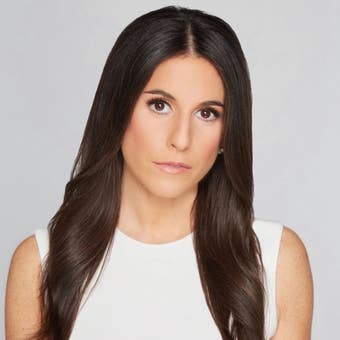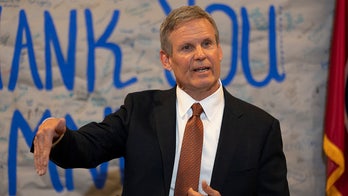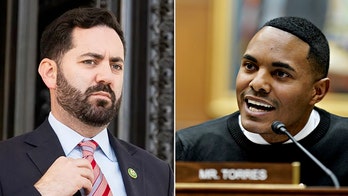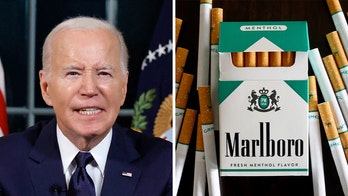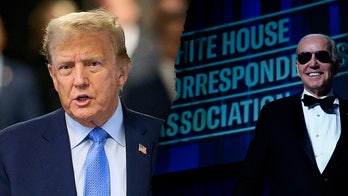President Biden completes strike against al Qaeda leader behind 9/11 attacks
Foreign correspondent Trey Yingst joins 'Special Report' from Jerusalem to discuss the killing of al Qaeda leader Ayman al-Zawahri.
President Biden announced Monday that the U.S. government killed the leader of al Qaeda, Ayman al-Zawahri, in a "successful" counterterrorism operation in Afghanistan that removes the terrorist from the battlefield "once and for all," and degrades the terror network's ability to operate.
The U.S. government, on July 30 at 9:48 p.m. ET, and 6:18 a.m. Kabul time, undertook a "precision counterterrorism operation," killing Zawahri, who served as Usama bin Laden’s deputy during the 9/11 attacks, and as his successor in 2011, following bin Laden’s death.
Biden, in an address to the American people on Monday night, said "justice has been delivered," and warned those that seek to do harm to the U.S.
The president explained that Zawahri "coordinated al Qaeda's branches all around the world" since bin Laden's death in 2011, including "setting priorities for providing operational guidance that call for and inspire attacks against U.S. targets."
WHO IS AYMAN AL ZAWAHRI? AL QAEDA LEADER KILLED IN AFGHANISTAN
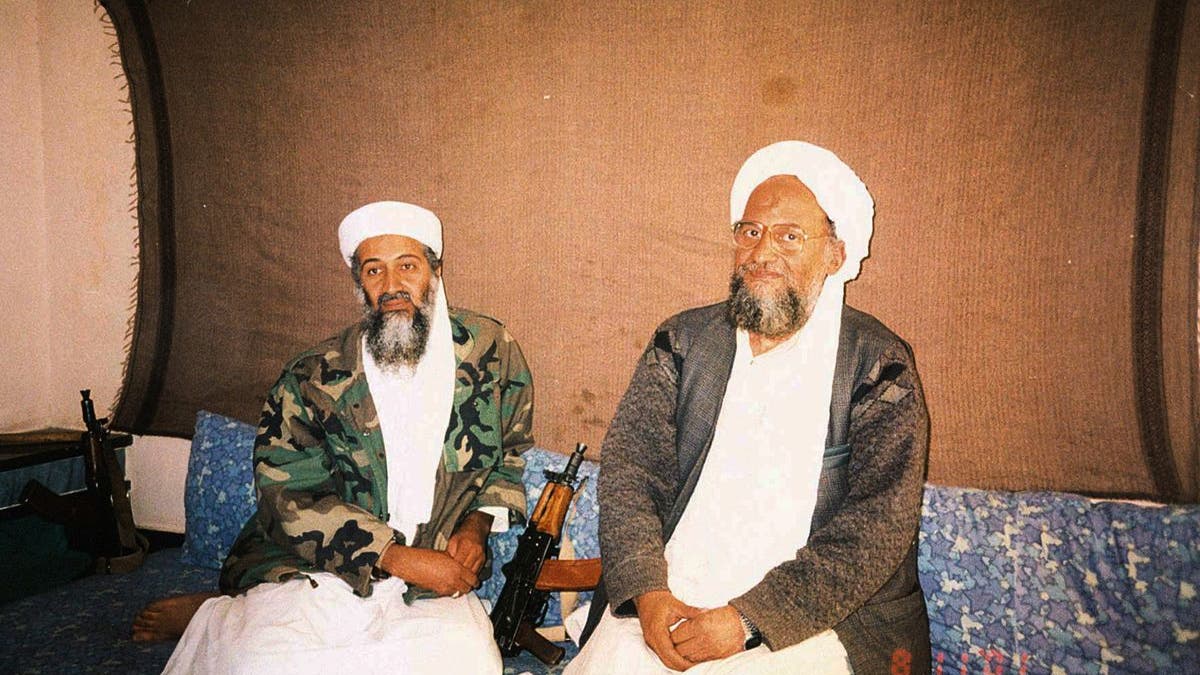
Usama bin Laden, left, and al Qaeda leader Ayman al-Zawahri (Hamid Mir/Editor/Ausaf Newspaper for Daily Dawn/Handout via REUTERS/File Photo)
Biden said Zawahri made videos, including in recent weeks, calling for his followers "to attack the United States and our allies."
"Now, justice has been delivered and this terrorist leader is no more," the president said. "People around the world no longer need to fear the vicious and determined killer.
"The United States continues to demonstrate our resolve and our capacity to defend the American people against those who seek to do us harm," Biden continued. "We make it clear again tonight that, no matter how long it takes, no matter where you hide, if you are a threat to our people, the United States will find you and take you out."
The president explained that he "authorized a precision strike that would remove [Zawahri] from the battlefield once and for all."
Biden gave the final approval "to go get him" on July 25.
REPUBLICANS JOIN DEMOCRATS IN PRAISING BIDEN FOR DEATH OF AL QAEDA LEADER ZAWAHRI
"I'm sharing this news with the American people now, after confirming the mission's total success through the painstaking work of our counterterrorism community and key allies and partners," the president said, adding that his administration has kept congressional leaders informed as well.
A senior administration official said Monday that there were no civilian casualties as a result of the operation.
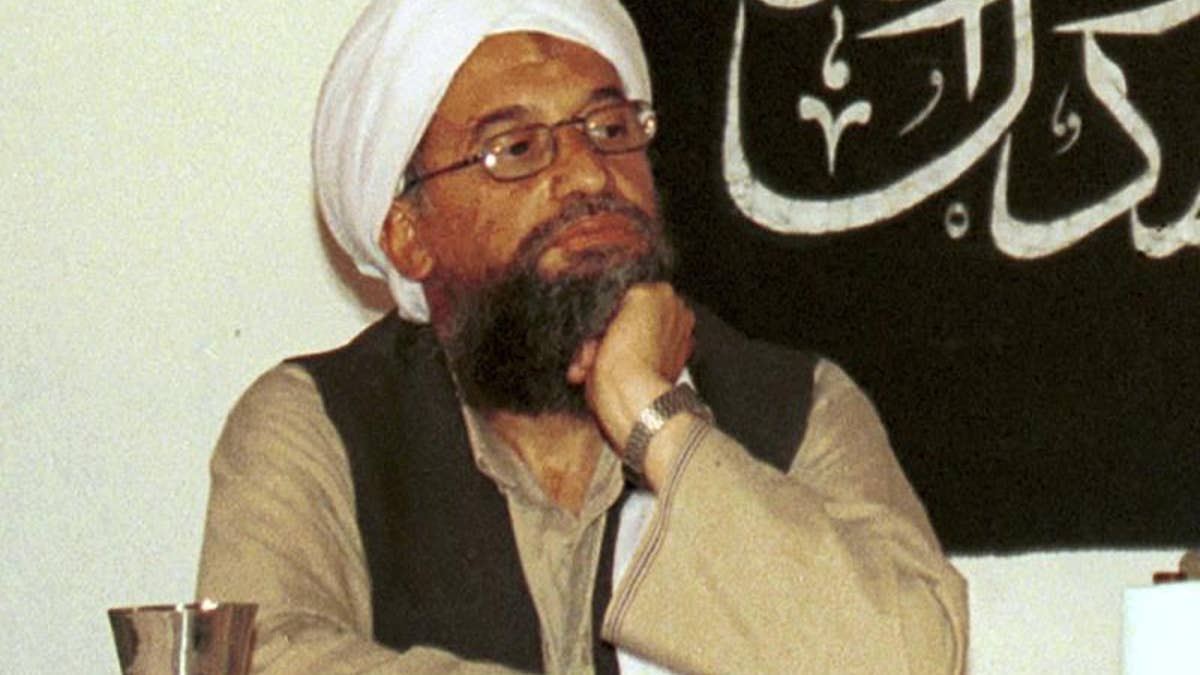
Al Qaeda leader Ayman al-Zawahri speaks on the 11th anniversary of Usama bin Laden's death. (AP Photo/Mazhar Ali Khan, File)
The president, speaking to his decision to withdraw U.S. military assets from Afghanistan in August 2021, said that he decided that "the United States no longer needed thousands of boots on the ground in Afghanistan to protect America from terrorists who seek to do us harm."
"And I made a promise to the American people that we continue to conduct effective counterterrorism operations in Afghanistan and beyond," Biden said. "We've done just that."
He added that the killing of Zawahri helps to "never again allow Afghanistan to become a terrorist safe have because he is gone."
"We're going to make sure that nothing else happens — you know, it can't be a launching pad against the United States," Biden said of Afghanistan. "We're going to see to it that won't happen. This operation is a clear demonstration that we will, we can, and will always make good on that solemn pledge."
Officials said Monday that Zawahri "continued to pose an active threat to U.S. persons, interests, and national security," and explained that the U.S. government has "multiple intelligence sources via multiple methods that had enabled us to confirm that this was Zawahri, and that we were successful in achieving our objective."
BIDEN ADMIN WARNED NOT TO WITHHOLD AFTER-ACTION REPORTS ON BOTCHED AFGHANISTAN WITHDRAWAL
The official said that the U.S. government identified Zawahri at a location in Kabul.
"The Zawahri family exercised longstanding terrorist tradecraft that we assessed was designed to prevent anyone from following them to Zawahri," the official explained, noting that the government identified Zawahri’s wife, daughter and her children at a safe house in Kabul this year.
In early April, Biden administration officials, including White House National Security Advisor Jake Sullivan, were briefed on that intelligence, which was later shared with the president.
Zawahri was located in a safe house, which U.S. government officials investigated the construction of so that they could "confidently conduct an operation to kill" him without threatening the structural integrity of the building and minimizing the risk to civilians and the Zawahri family.
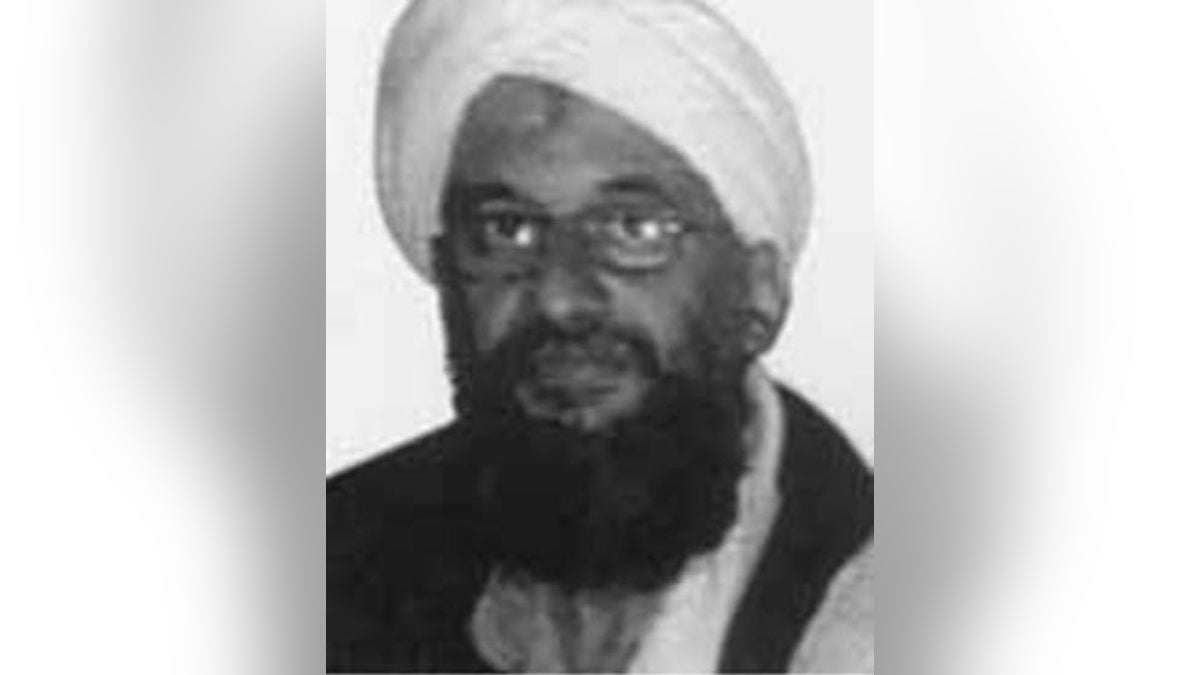
Al Qaeda leader Ayman al-Zawahri's FBI "Most Wanted" mugshot (Federal Bureau of Investigations)
The official explained that "only a very small and select group of officials at key agencies were brought into the process and the deliberations at the early stage" and briefed on the developing intelligence.
"The president convened over the course of the last few weeks several meetings with his key advisers and cabinet members to carefully scrutinize the intelligence and evaluate the best course of action for targeting Zawahri," the official explained, noting that Biden received updated on the developments of the targets throughout May and June.
On July 1, Biden was briefed on a proposed operation in the White House Situation Room by key members of his Cabinet, including CIA Director William Burns, Director of National Intelligence Avril Haines and National Counterterrorism Center Director Christine Abizaid, as well as other national security officials.
"The president was, as always, deeply engaged in the briefing and immersed in the intelligence. He asked detailed questions about what we knew and how we knew," the official explained, noting that the president sought explanations of "lighting, of weather, of construction materials and of other factors that could influence the success of this operation and reduce the risk of civilian casualties."
AL QAEDA LEADER AYMAN AL-ZAWAHRI KILLED IN DRONE STRIKE: 9/11 FAMILIES REACT
"He was particularly focused on ensuring that every step had been taken to ensure the operation would minimize that risk and he wanted to understand the basis upon which we had confidence in our assessment," the official continued.
Biden then directed the intelligence community to prepare a series of impact analyses that he could fully understand, and directed that the U.S. government be "prepared to manage the ramifications of the strike in the region and beyond."
Biden and officials met multiple times in person in the White House Situation Room over the course of June and July to "pressure test" the intelligence.
The official explained that interagency lawyers examined the intelligence reporting as well to confirm "the legal basis for the operation."
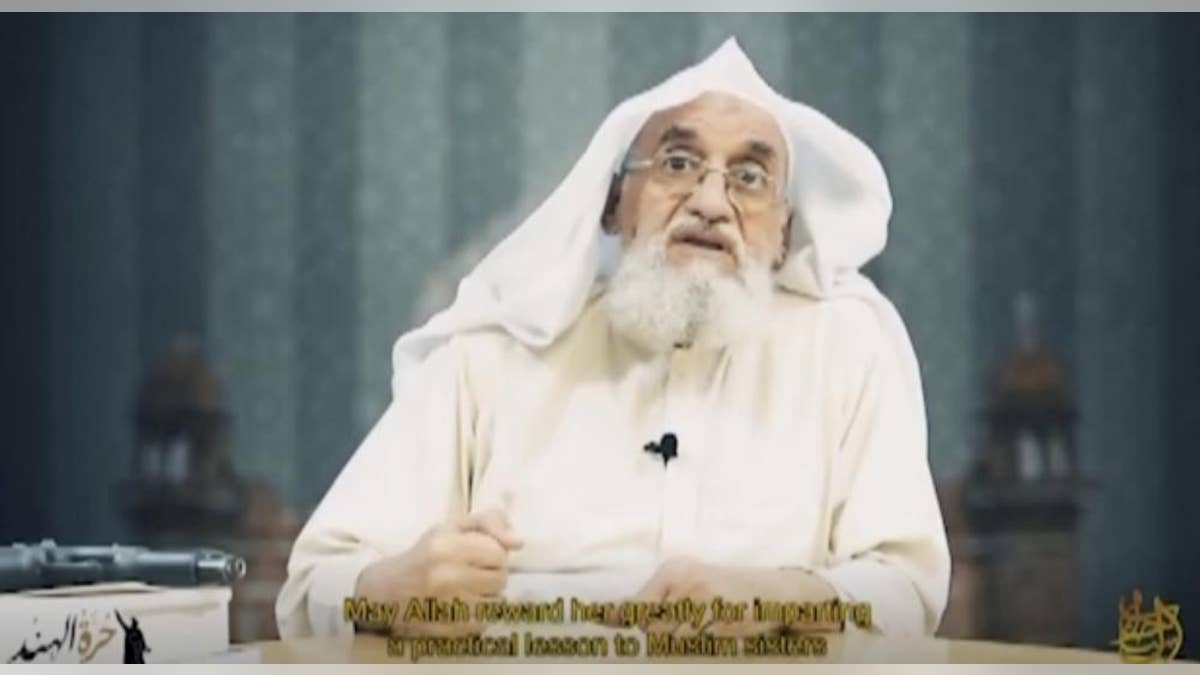
This image taken from a video issued by al-Sahab, al Qaeda's media branch, on April 5, 2022, shows al Qaeda leader Ayman al-Zawahri speaking. In the rare video, al-Zawahri praises Muskan Khan, an Indian Muslim woman who in February defied a ban on hijab wearing, revealing the first proof in months that he is still alive. (Al-Sahab via AP)
"They confirmed that Zawahri was a lawful target based on his continuing leadership role in al Qaeda and his participation and operational support for al Qaeda attacks," the official said.
President Biden authorized the air strike on July 25 at the conclusion of a meeting with officials.
The official said the president asked for "each participants’ view," and said "all strongly recommended approval of this target."
"At the conclusion of the meeting, the president authorized a precise, tailored air strike on the condition that a strike minimize, to the greatest extent possible, the risk of civilian casualties," the official explained, noting that meant the government could conduct a strike "once an opportunity was available."
On July 30, the strike was carried out by unmanned aerial vehicles. Two hellfire missiles were fired at Zawahri, and he was killed.
A senior administration official said the government identified Zawahri on "multiple occasions for sustained periods of time on the balcony, where he was ultimately struck."
"We are confident through our intelligence sources and methods, including multiple streams of intelligence, that we killed Zawahri and no other individual," the official said, noting that members of his family were present "in other parts of the safe house at the time of the strike and were purposefully not targeted and were unharmed."
"We have no indication that civilians were harmed in the strike," the official said.
"Zawahri’s death deals a significant blow to al Qaeda and will degrade the group’s ability to operate, including against the U.S. homeland," the official explained. "This action keeps faith with the president’s solemn pledge to protect Americans from terrorist threats, including threats that might emerge from Afghanistan."
The Biden administration closed the U.S. Embassy in Kabul and withdrew all military assets from Afghanistan on Aug. 31, 2021, ending the U.S.' longest war.
"Even as the president ended two decades of war in Afghanistan by getting American servicemen and women out of harm’s way there, he promised that we would establish a capacity from outside the country to identify and address terrorist threats to Americans," the official said. "He made good on that with this action, as U.S. forces showed extraordinary capacity to build an intelligence picture on the world’s most-wanted terrorists, and then take precise action to remove him from the battlefield."
The official added that the president’s decision "has made the world a safer place and brought an additional measure of closure for all of us who mourn the victims of 9/11 and other al Qaeda violence."
Biden, during his speech Monday night, also cited other missions that eliminated terrorists since the withdrawal from Afghanistan, and said his administration "will continue to vigilantly monitor and address threats from al-Qaeda no matter where they emanate from."
"As Commander in chief, it is my solemn responsibility to make America safe in a dangerous world," Biden said. "The United States did not seek this war against terror--it came to us, we answered with the same principles and resolve that have shaped us for generation, upon generation to protect the innocent, defend liberty, and we keep the light of freedom burning a beacon for the rest of the entire world."
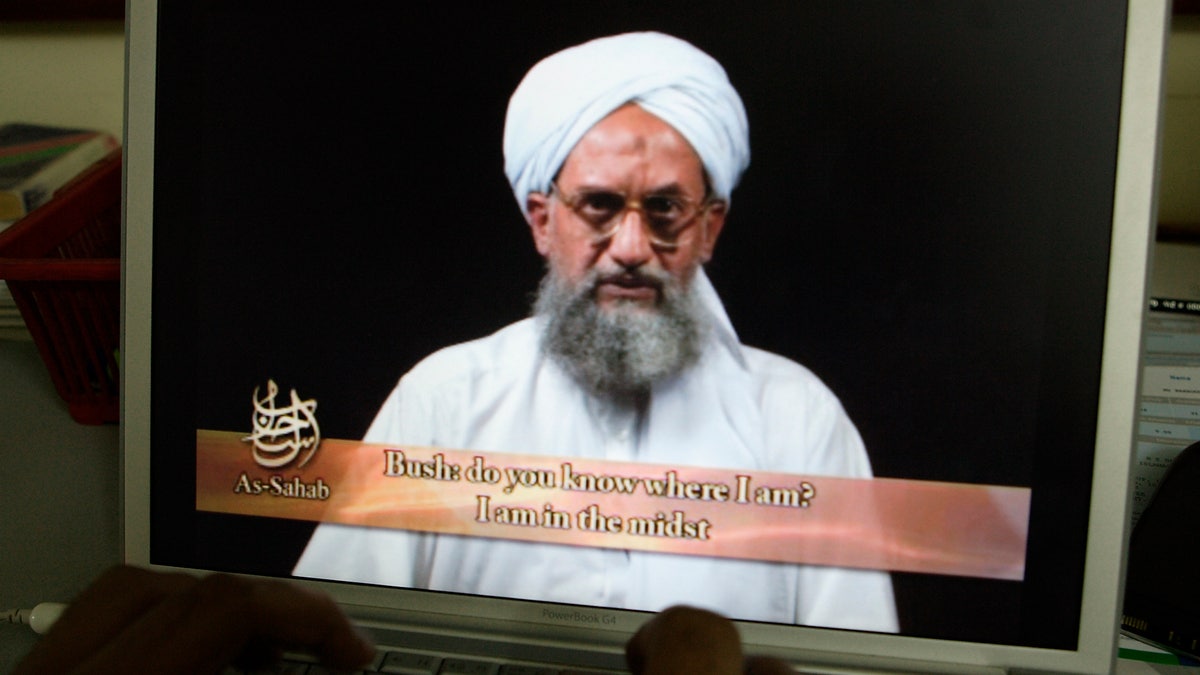
As seen on a computer screen from a DVD prepared by Al-Sahab production, al Qaeda's Ayman al-Zawahri speaks in Islamabad, Pakistan, on June 20, 2006. (AP Photo/B.K.Bangash, File)
Biden added that a "great and defining truth about our nation, our people" is that "we do not break. We never give in. We never back down."
Meanwhile, the official Twitter account of the Spokesman of Islamic Emirate of Afghanistan, Zabihullah Mujahid, the Taliban, on Monday posted that an "air strike was carried out on a residential house in Sherpur area of Kabul city," saying that the "nature of the incident was not revealed at first."
The spokesperson condemned the strike: "The security and intelligence agencies of the Islamic Emirate investigated the incident and found that the attack was carried out by American drones. The Islamic Emirate of Afghanistan strongly condemns this attack on any pretext and calls it a clear violation of international principles and the Doha Agreement."
The Taliban spokesperson added: "Such actions are a repetition of the failed experiences of the past 20 years and are against the interests of the United States of America, Afghanistan and the region. Repeating such actions will damage the available opportunities."
A senior Biden administration official said the U.S. government "did not alert the Taliban that we were going to take this strike."
President Biden defended pulling out of Afghanistan last year by claiming al Qaeda was gone.
"What interest do we have in Afghanistan at this point with al Qaeda gone?" Biden said on Aug. 20, 2021. "We went to Afghanistan for the express purpose of getting rid of al Qaeda in Afghanistan, as well as — as well as getting Osama bin Laden. And we did."
CLICK HERE TO GET THE FOX NEWS APP
But Chairman of the Joint Chiefs of Staff Gen. Mark Milley warned lawmakers last September that terror groups like al Qaeda may be able to grow much faster following the U.S. withdrawal from Afghanistan.
Defense Secretary Lloyd Austin, at the time, said that the focus of continued U.S. military efforts in Afghanistan would be countering terrorist threats, not the Taliban. Austin said the U.S. would "keep an eye on" al Qaeda, the extremist network whose use of Afghanistan as a haven for planning the 9/11 attacks on the U.S. was the reason U.S. forces invaded Afghanistan in 2001.
Ayman al-Zawahri appeared in a video last year commemorating 20 years after the 9/11 terrorist attacks despite rumors that he died months earlier.
Officials on Monday said Zawahri continued to produce videos once he arrived at the safe house in Kabul. Officials said the U.S. "should not be surprised if Zawahri filmed additional videos that may be released subsequent to his death."
Former Vice President Dick Cheney told Fox News Digital in reaction to the news of the operation: "It's good that we got him, I've been out of the business for many years, so I am waiting to learn all the facts."
Cheney served under former President George W. Bush, whose administration led the Global War on Terror after the attacks on Sept. 11, 2001.
Fox News' Andrew Murray and Jon Brown contributed to this report.
